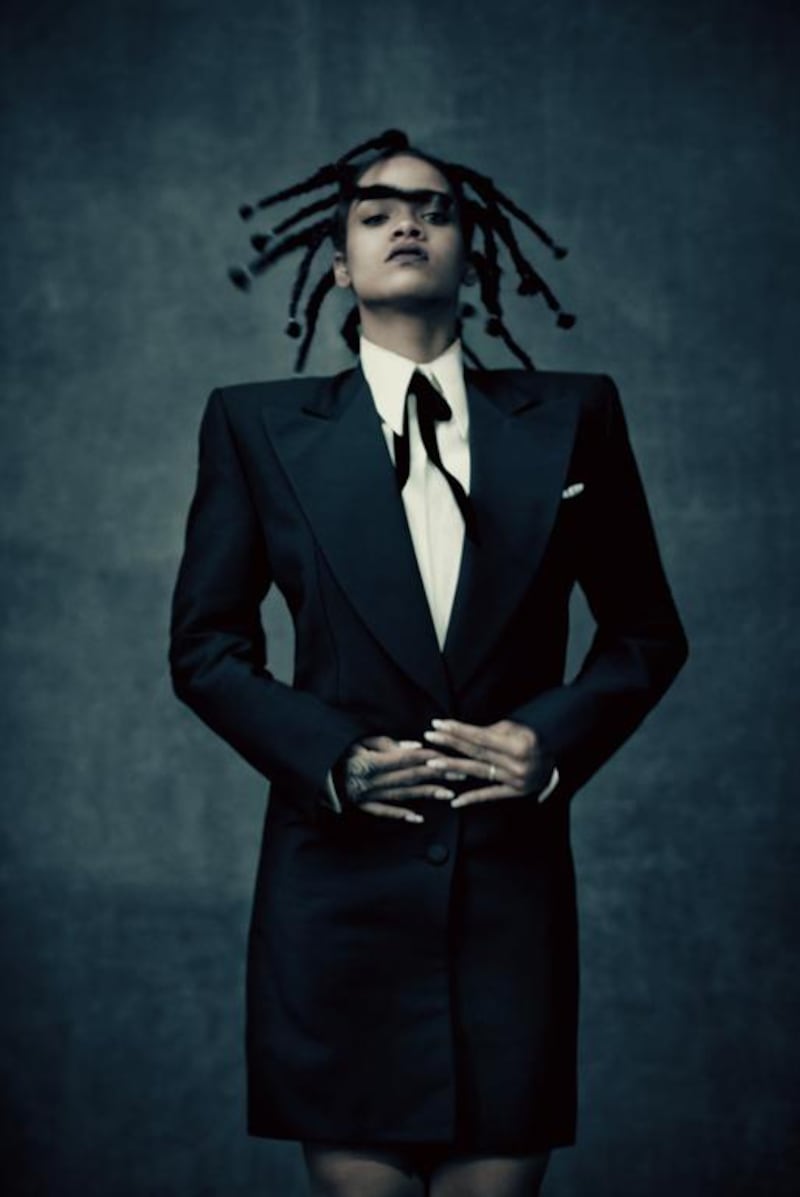When Rihanna burst onto the airwaves, and front pages, in the mid-2000s, did anyone envisage that the media zeitgeist would still be swirling around her a decade later, like cars hurtling round a Formula 1 track?
The Barbadian singer, the star of the final Abu Dhabi Grand Prix after-race concert at Yas Island’s du Arena on Sunday, remains arguably the world’s most talked-about woman.
This week, she reportedly attempted to calm her still-feuding exes, Chris Brown and Drake, while the latter – due in Abu Dhabi this weekend for his own post-race appearances – wrote some pained new lyrics about his old flame after he and RiRi won an American Music Award for the single Work.
It takes a special talent, and character, to generate such avid interest for so long – but then, Rihanna is perhaps the perfect example of the post-millennial pop star. If Michael Jackson defined the MTV generation, she surfed the social-media wave. YouTube was launched just a few months before the release of her first single, Pon de Replay from Music of the Sun, in 2005, with Twitter following in 2006. The pop star and those platforms have grown together.
Indeed, it is debatable whether a reclusive talent such as Jackson would be so successful in today’s instant-gratification culture.
Growing up, the young Robyn Rihanna Fenty was instead inspired by Madonna, who kept the hits and headlines flowing, and – unlike Jackson – skilfully controlled her own image.
She might have performed some lacklustre gigs over the years, but as the aforementioned hit suggests, hard work is the key to Rihanna's continued success. She released an album a year between 2009 and 2012, pushing pop's parameters along the way. Even the track that made her a household name, Umbrella, is pretty quirky.
That song – featuring her early mentor and label boss, Jay Z – appeared on her second album, Good Girl Gone Bad, in 2007. But the "real" Rihanna truly began to emerge with her next LP, 2009's Rated R, which she executive produced. Taking control, RiRi adopted a sometimes jarringly assertive approach, alienating casual fans but inspiring the next wave.
“I love her,” said chart-topping US singer Halsey, this week. “I wish she was my big sister.”
Rihanna’s subsequent albums are prime examples of today’s stream-before-you-buy culture: no filler, numerous bonus tracks and a boundary-free approach to genres, all of which requires a steady supply of fresh talent.
Pop haters may scoff, but her records boast a carefully curated, frequently surprising array of songwriters, producers and guest performers.
Having adopted a more aggressive rap, rock and dubstep-influenced sound in the late 2000s, featuring guests such as Slash and Nicki Minaj, she then worked with two relatively uncool UK acts: Scottish DJ Calvin Harris, on the club banger We Found Love, and Coldplay, on their album ballad Princess of China. Both were calculated risks – and mammoth, memorable hits. RiRi became a fearless herald for the present-day anything-goes pop landscape.
That approach helped launch new talents, too. The 2012 album Unapologetic was again heavily influenced by club culture, but also featured fine contributions from two singer-songwriters: Half of Me, written by Scottish singer Emeli Sandé, and Stay, a lovely duet featuring Louisiana's Mikky Ekko, both of whom enjoyed healthy career boosts.
Those jarring switches continue. Last year she worked with Paul McCartney – and Kanye West – on acoustic single FourFiveSecond. The single was omitted from her eighth album, ANTI, which again veered wildly between sounds, albeit less up- tempo dance. Well, she is 28 now.
Rihanna’s now-iconic imagery also emerged in the fury of the late 2000s, as she swapped safe, fun colours for a darker, punkier feel. That look endures through her signature Fenty collection for Puma, a sort of gothic sports-casual that is distinctively RiRi.
Few artists have achieved such wildly diverse aesthetics, mind you, from demure catwalk queen to bare, tattooed cover star. This year, a Colombian artist built a huge, headless statue of her outside a Berlin gallery, as a symbol of modern celebrity culture.
That enduring fame is fuelled by the fervent gossip, of course, and her look and sound are invariably interwoven with the headlines. The angrier Rated R was released after the violent end to her relationship with Chris Brown, but Unapologetic then featured a duet with Brown, which caused more bewildered media conjecture.
As for Drake, it has been suggested that their four tracks together form a concept EP about that relationship, from the flirtatious What's My Name (2010) to the fizzling-out Too Good (2016). Rihanna remains pop's foremost femme fatale.
An acting career looks to be the future life goal, given that pop and fashion have largely been conquered. Ms Fenty will soon to be seen in the robbery reboot Ocean's Eight, and sci-fi epic Valerian and the City of a Thousand Planets – both major projects. How her performances are received remains to be seen – that is one aspect of Madonna's career she won't want to match.
• Rihanna will perform at du Arena, Yas Island, on Sunday as part of the after-race concerts. The show is open only to race-day ticket holders. www.yasmarinacircuit.com
artslife@thenational.ae





